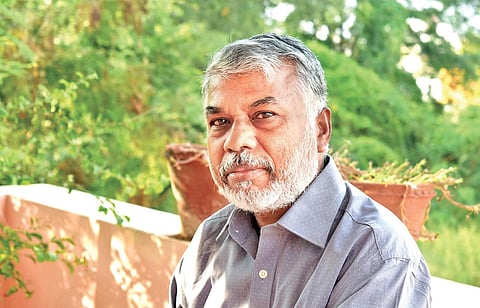

The star of contemporary Tamil literature, Perumal Murugan is an award-winning writer, poet and scholar. Author of 10 novels, an equal number of short story collections and poems and another 10 works of non-fiction, he has garnered both critical acclaim and commercial success. His best-known novel, One Part Woman, won the prestigious ILF Samanvay Bhasha Samman for writing in Indian languages and his last novel, Poonachi, has been shortlisted for several awards. As he gets set to make an appearance once again at the upcoming Jaipur Literature Festival—from January 23 to January 27, 2020, he takes out time to speak to us about stories with goats and rural settings, creative freedom and what he is working on in the coming year.
Tell our readers about Poonachi (The Story of a Black Goat). What was the inspiration behind it and what are some of its underlying themes?
Since childhood, I lived along with sheep as equal to human beings. So, I know a lot about them. It is our nature to treat them like humans. Every sheep we raise has a name. They understand the language we speak. We know their voices have different meanings. On that basis, I began to write a short story about a goat without a problem. Unknown to me, it grew to the size of a novel. My intention is not to underline anything other than describing the life of the goat. Unbeknownst to me, I think in some places there are opportunities to look at it from different angles.
What was the process you used to liken the story of a simple animal to reflect humans and the contemporary issues and complex emotions of their world?
I had no intention of writing on human emotions. I was clear on that. I only had the intention of writing about its problems from the angle of the goat. So, I wrote down its point of view, simply and naturally.
How do your childhood experiences of growing up in a farmer’s family influence the rural subjects and settings of your writings?
I have resided in the village not only through my childhood but also till this day. So, I
have had continuous contact with the land and the animals.
I never gave up farming. I have a great interest in writing about village life as well as men and cattle.
Your latest book, Amma, is a set of stories about your mother. What influence did she have on your career as a writer?
My mother was illiterate. But it was her behaviour—her words and actions—that formed me. It was she who took me out from a narrow world. She did it naturally. Her contribution to my writing personality has been a strong backdrop.
In 2015, you announced your ‘death’ on your Facebook wall following protests from the Gounder community over your 2010 novel Mathorubhagan (One Part Woman). What motivated you to do this and how did the incident influence your future writings?
I still do not feel like talking about the incident. The truth is that the incident never let me write. Writing came back to me after the judgment of the Madras High Court.
What, according to you, are the struggles writers face today in terms of creative freedom, especially when writing about religion and caste?
There have always been problems with writing about caste and religion. In recent times, it has become too much. So, I think we writers are forced to think about a new writing process.
You said somewhere that there is more freedom in writing fiction than non-fiction. Please elaborate.
The freedom that comes with writing fiction is amazing. The creator is free to do anything. However, in non-fiction writing, worldly life is within the boundaries of the creator. In a sense, the difference between fiction and non-fiction is the difference between fiction and everyday life.
What, according to you, is the current scope of fiction and non-fiction translations into English from various Indian regional languages?
Today, there is an opportunity to translate many texts from Indian languages into English. That’s a very good thing. These translations are of great use to broaden English reading and the spread of English literature. It brings great joy.
What are you working on?
Now, I am trying to write some short stories. The year 2020 is the year of the short story for me.